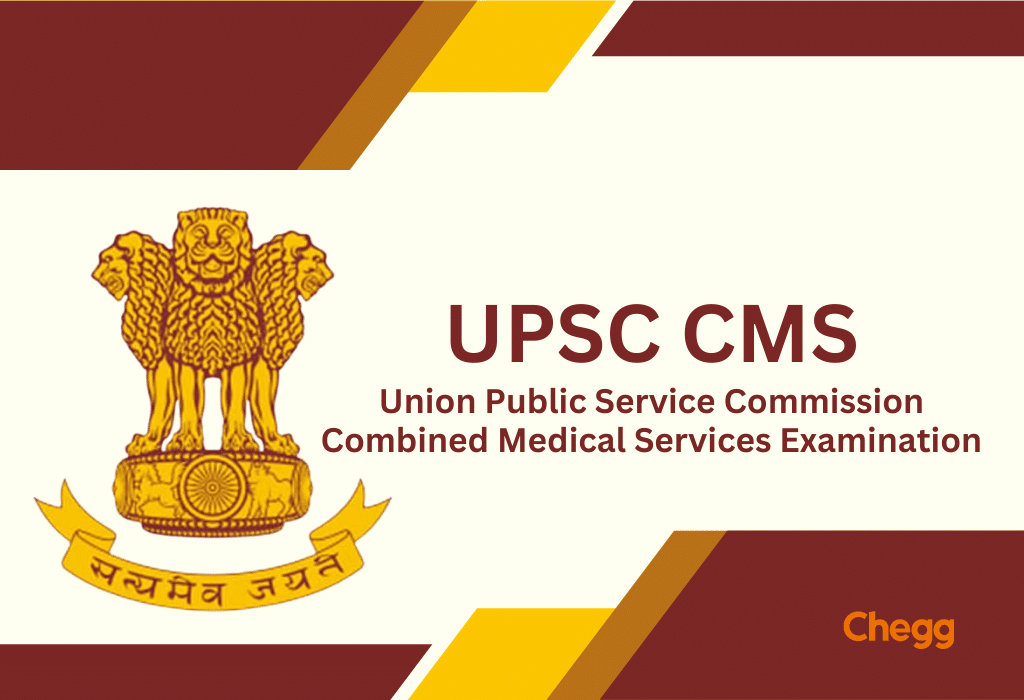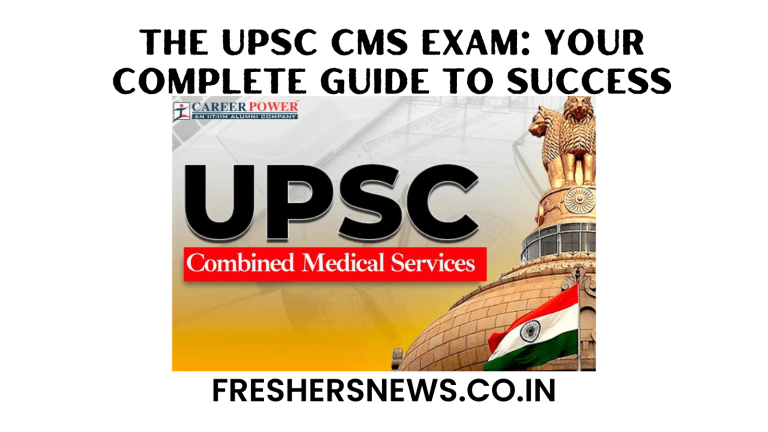Introduction
Now, you have set your aim to serve society as a medical officer. Ok then, you must plan to qualify for the Union Public Service Commission (UPSC) Combined Medical Services (CMS) examination exam, and it will be the gateway to your dream career. This entire blog will equip you with all the essential information you need to navigate the CMS confidently. Let’s dive into The UPSC CMS Exam: Your Complete Guide to Success.

Image source: cheggindia
Let’s dive into The UPSC CMS Exam: Your Complete Guide to Success:
Eligibility Criteria
- Possess an MBBS degree recognized by the Medical Council of India (MCI).
- Be an Indian citizen or meet specific requirements for other eligible nationalities.
- The age limit varies between 21 and 32 years old (as of the notification date).
- Additional criteria may apply based on specific services and categories.
Exam Pattern
- Written Exam: A single computer-based test (CBT) with objective-type questions. Marks obtained in this stage determine eligibility for the next stage.
- Personality Test: An in-depth interview process to assess your suitability for the chosen service and potential for a successful career.
Important Dates
- April 10, 2024: Expected release of official notification and application form opening.
- April 30, 2024: Last date to submit applications.
- July 14, 2024: tentative date for the written exam.
- To be announced: Dates for personality tests will be announced later.
How to prepare for UPSC CMS
- Understand the syllabus and examination pattern.
Making a clear concept regarding “what to study.” “How will it be asked?”
- Create a study plan.
Once you have the perfect materials, you must create a study plan. This will help you stay on track and ensure you cover all the crucial topics. Your study layout has to be realistic and achievable, and it is necessary to plan practical time for every analysis of a new topic and revise what you have already learned.
- Self-study or coaching
The most common question in students’ minds is how to prepare for the C exam and whether to take coaching. The best decision will be a combination of both. Now, CMS is not something you have included in your school curriculum. Therefore, coaching will guide your preparation by providing relevant study materials and tests. Then, you can solve exercises and review materials to study independently.
- Work on the fundamentals.
Developing fundamental concepts should be prioritized before moving on to CMS exam-level questions. So, focus on studying basic concepts and practicing easy questions first. Then, gradually move on to higher-level questions.
- Practice lots of questions.
After completing a topic, practice asking as many questions as possible. Move from lower to higher-difficulty questions. Reviewing the concepts a few times through practice can help you prepare for the CMS exam.
- Analysis of the test
A practice test is a simulation of the actual test. So, as the exam approaches, taking practice tests regularly should be a part of your CMS preparation strategy. Additionally, it is equally important to analyze your simulations and identify your weaknesses.
- Practice regularly
One of the best approaches to put together for the CMS examination is to practice answering questions regularly. You can do this by solving exercise papers and taking mock tests. Many special exercise papers and mock tests are available on the Internet and in books.
- Stay motivated.
It is essential to be stable, active, and motivated throughout your preparation.
- Focus on your weak areas.
As you start answering questions, you will perceive your weak areas. Once you know your weak areas, you can focus your research on these topics. You will additionally need to get additional exercise material for these topics.
About the syllabus of the UPSC CMS exam
Paper 1
General Medicine
- Cardiology
- Respiratory diseases
- Gastrointestinal system
- Genitourinary system
- Neurology
- Hematology
- Endocrinology
- Metabolic disorders
- Infectious diseases
- Nutrition and growth
- Dermatology
- Musculoskeletal system
- Psychiatry
- Emergency medicine
- Common poisoning
- Snakebite
- Tropical medicine
- Critical care medicine
- Pathophysiology of diseases
- Vaccine-preventable and non-vaccine-preventable diseases
- Vitamin deficiency diseases
- Mental health disorders like depression, psychosis, anxiety, and bipolar disorder
- Pediatrics:
- Growth and development
- Neonatal problems
- Common childhood illnesses
- Immunization
- Nutritional disorders
- Congenital anomalies
- Adolescent health problems
Paper 2
Surgery
- General surgery principles
- Wounds, infections, tumors, and lymphatic system
- Specific surgical procedures for various body parts (e.g., head and neck, breast, abdomen, etc.)
- Anesthesia and pain management
- Traumatology and management of injuries
- Pre- and post-operative care
- Medicolegal and ethical aspects of surgery
- Gynecology and Obstetrics:
- Female reproductive system anatomy and physiology
- Menstrual disorders
- Infertility
- Pregnancy and childbirth management
- Obstetrical complications
- Gynecological surgeries
- Preventive and Social Medicine:
- Concepts of health, disease, and prevention
- Health administration and planning
- Epidemiology and Biostatistics
- Demography and health statistics
- Infectious diseases and their control
- Environmental health and sanitation
- Nutrition and health
- Occupational health
- Medical ethics and sociology
- Maternal and child health programs
- National health programs
Which books should I prefer for the UPSC CMS exam?
General Medicine
- Harrison’s Principles of Internal Medicine by Anthony S. Fauci et al.
- Davidson’s Principles and Practice of Medicine by Brian R. Walker, Nicki R. Colledge, Stuart H. Ralston, and Ian D.B. Little
- The Oxford Handbook of Clinical Medicine by Ian R. Bickersteth et al.
Surgery
- Sabiston and Spencer Surgery of the Chest by David C. Sabiston Jr. et al.
- Schwartz’s Principles of Surgery by F. Charles Brunicardi et al.
- Bailey & Love’s Short Practice of Surgery by Norman S. Williams, Christopher J. Moran, and Graeme G. Dunlop
Gynecology and Obstetrics
- Williams Obstetrics, by Barbara Hoffman et al.
- DeCherney & Lachee’s Clinical Obstetrics & Gynecology by Alan G. Gimpel et al.
- Ten Teachers of Obstetrics and Gynecology, by Hannah Neame et al.
Preventive and Social Medicine
- Park’s Textbook of Preventive and Social Medicine by K. Park
- Essentials of Community Medicine by S.M. Tewari
- The Oxford Textbook of Public Health by Roger Detels et al.
Common mistakes to avoid in the UPSC CMS
- Instead of analyzing the examination pattern, questions, and syllabus, it is essential to have a clear concept regarding the study program and which topics to focus on.
- Not managing time effectively: time management is essential in any competitive exam.
- Not practicing regularly: One of the excellent methods to put together for the CMS examination is to practice answering questions regularly.
- Making common mistakes: In any competitive exam, it is crucial to concentrate and keep away from making careless mistakes.
- Not focusing on weak areas: As you practice answering questions, you will become aware of your weak areas.
FAQs
What are the career possibilities after qualifying for the UPSC CMS exam?
Upon selection, you may be appointed as an Assistant Medical Officer (AMO) in several central authority groups, like CHS, railways, and ordnance factories. The professional route presents various opportunities in medical practice, public fitness management, research, and teaching. You can additionally pursue more significant research and specialize in precise fields.
How do you avoid exam anxiety and perform optimally?
- Practice relaxation techniques
- Visualize success
- Practice mock tests in timed conditions
- Seek professional help if needed
What is the minimum number of marks required to qualify for the interview stage?
There is no fixed minimum qualifying mark for the written exam. The cutoff varies every year based on the question status of the exam, the number of applicants, and the number of vacancies available.
How do I manage time effectively during my preparation?
Follow these tips:
- Create a realistic study schedule.
- Utilize your commute or breaks for revision.
- Optimize your study sessions.
- Delegate and prioritize.
- Maintain a healthy lifestyle.
What are the critical traits assessed in the personality test stage?
They examine management qualities, conversation skills, decision-making abilities, dedication to public service, and average character characteristics that align with the organization’s values.
Conclusion
In conclusion, navigating the UPSC CMS examination requires a well-defined strategy, unwavering dedication, and a clever method to avoid common mistakes. You can increase your probability of success by understanding the syllabus, using various resources, enhancing your time management skills, and working towards the personality test. Remember, this journey needs steady effort, a positive mindset, and a dedication to excellence. Embrace the challenge, use the recommendations and tips provided, and confidently attempt to achieve your dream of serving the community through this prestigious career path. As you embark on this enriching journey, take note that every step ahead brings you closer to your closing goal. So, remain focused, remain motivated, and give it your all!

